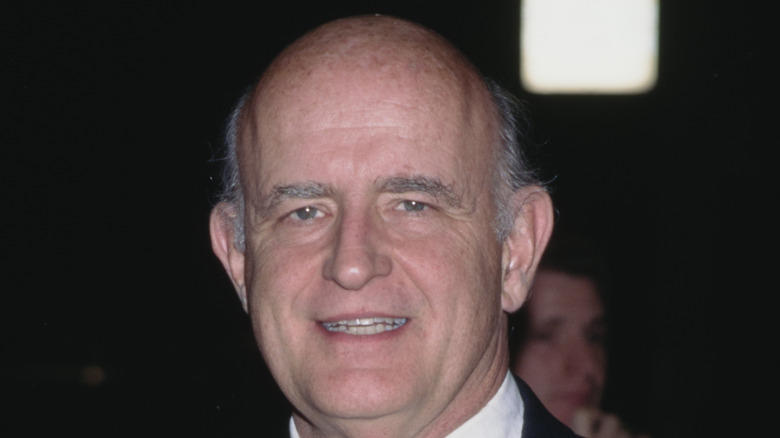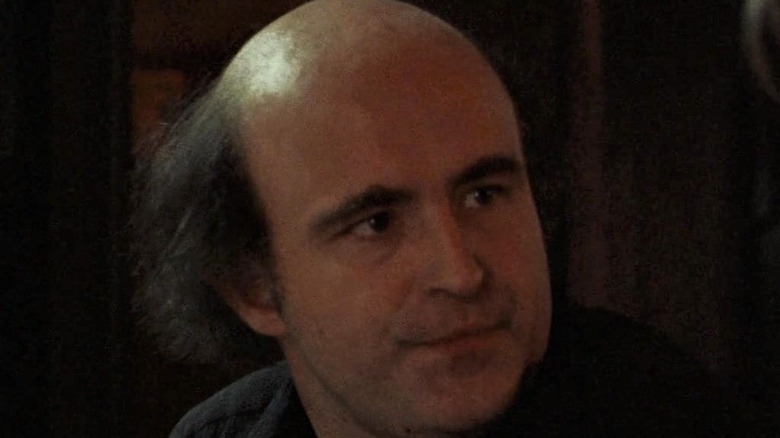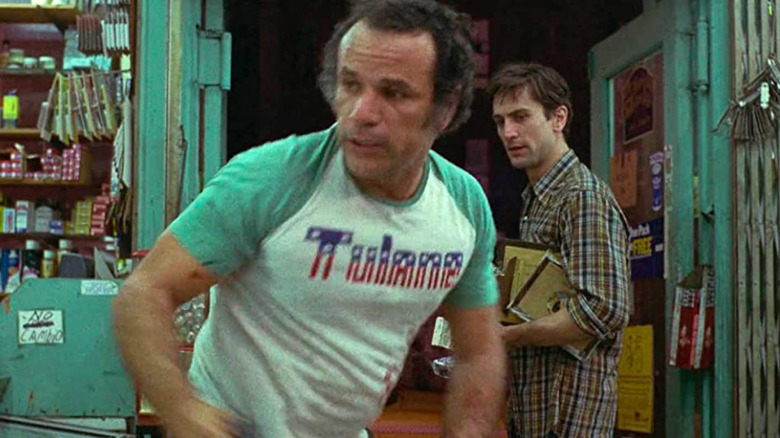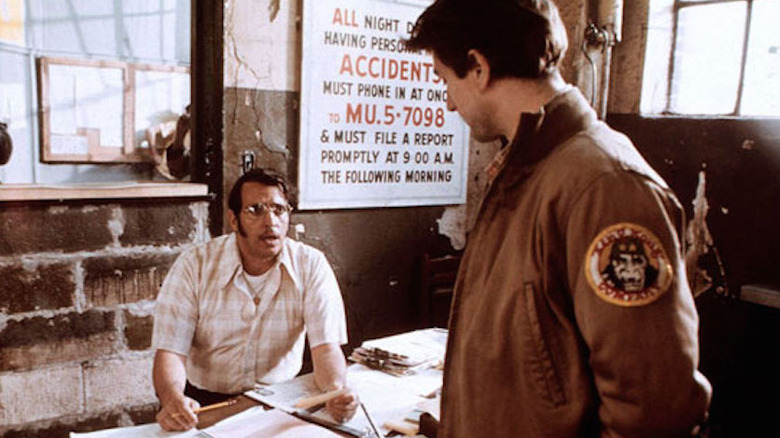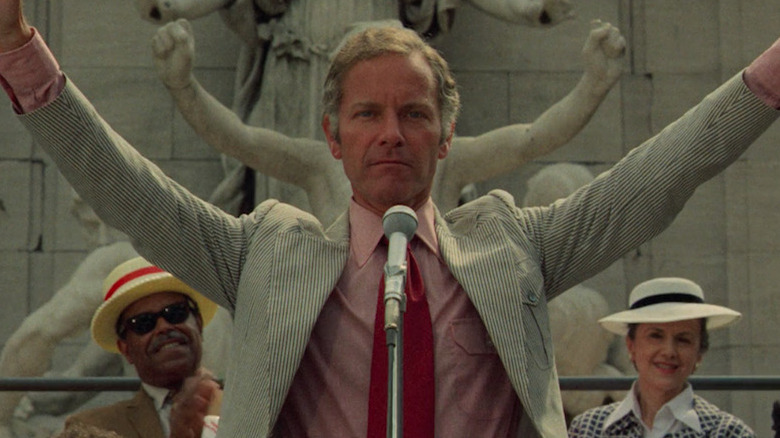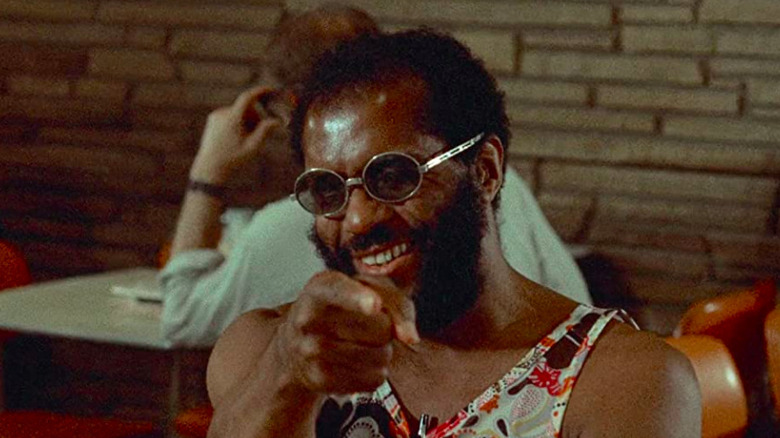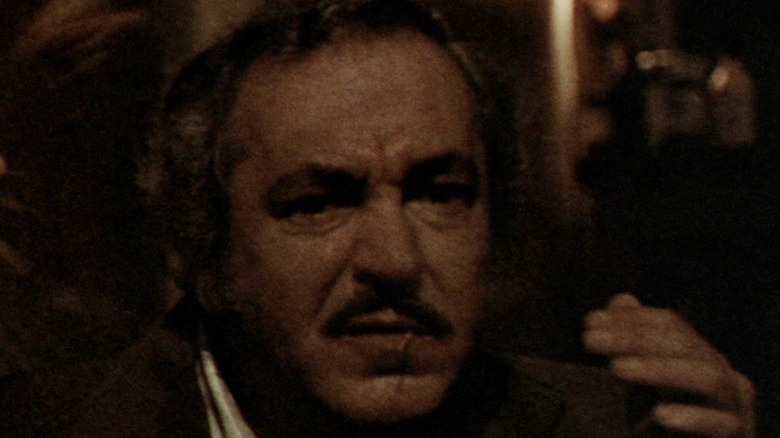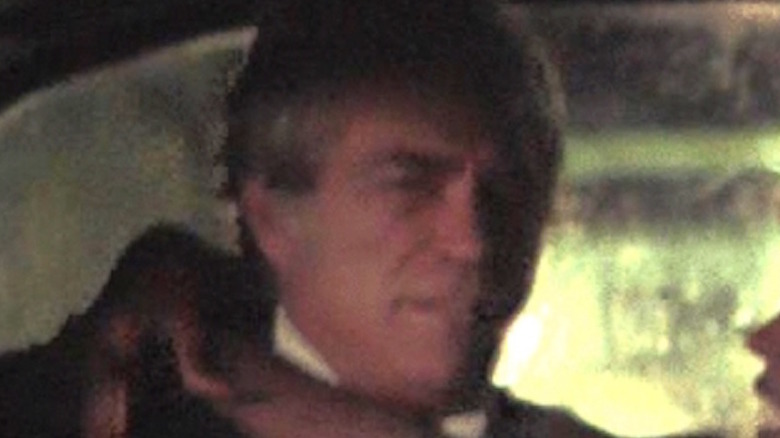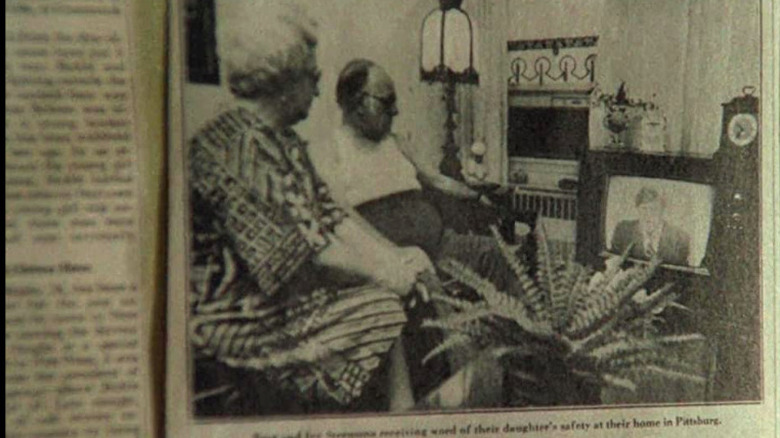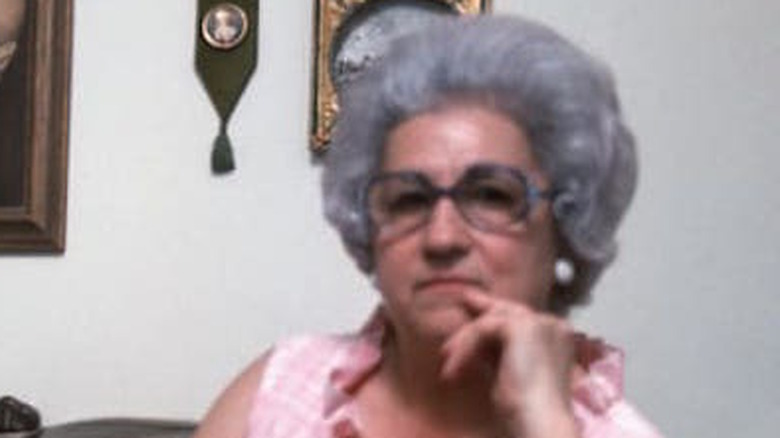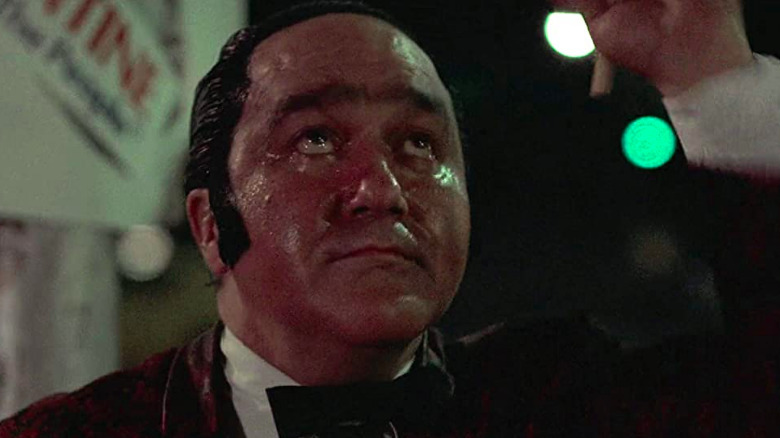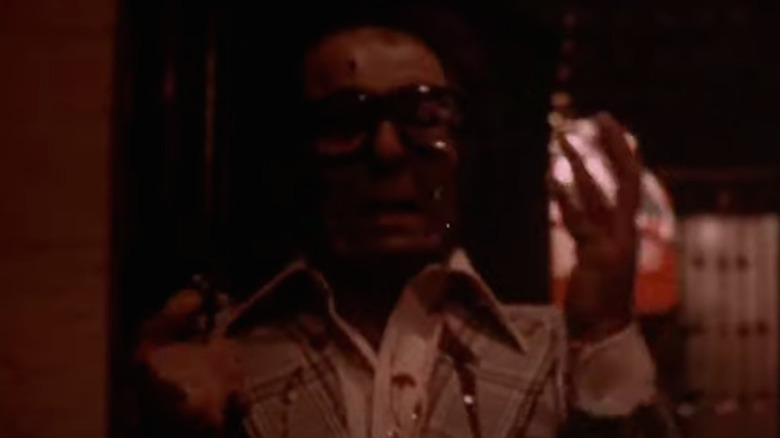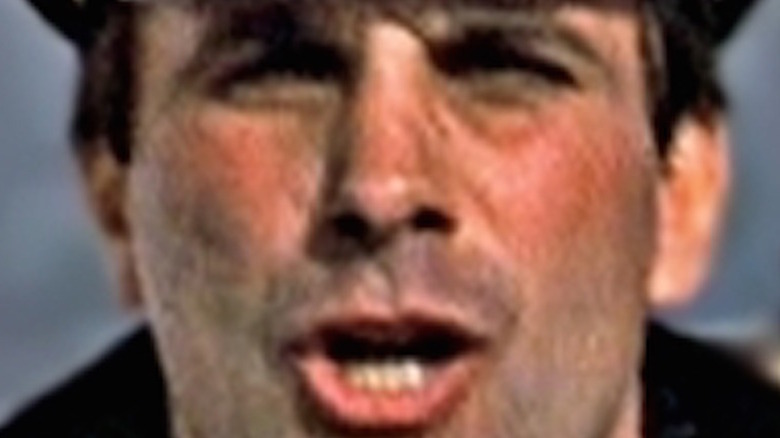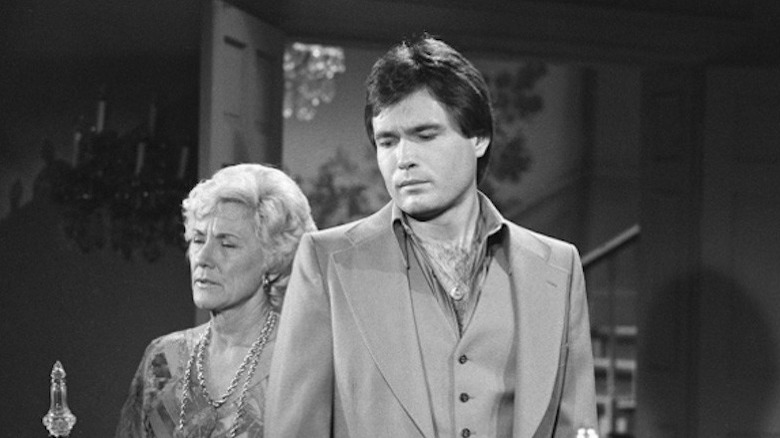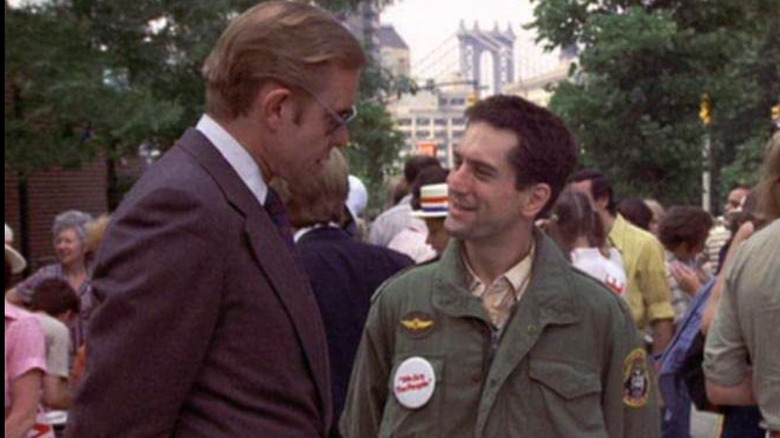The Taxi Driver Actors You May Not Know Passed Away
Martin Scorsese's 1976 feature "Taxi Driver" remains one of his most powerful and celebrated films — quite the high praise in a career so remarkable. The drama — about a Vietnam War veteran (played by Robert De Niro) whose lonely existence as a cab driver in New York sets ablaze mental issues that result in a eruption of violence — earned critical praise for its star, director, and writer Paul Schrader, as well as the Palme d'Or at the Cannes Film Festival and four Academy Award nominations, including Best Picture and Best Supporting Actress for Jodie Foster as Iris, an underage prostitute. The film also generated criticism for its dark themes and graphic bloodshed — which played an unfortunate part in John Hinckley, Jr.'s assassination attempt on President Ronald Reagan.
A combination of bold direction, gripping suspense, and wickedly memorable dialogue ("You talkin' to me?") have made "Taxi Driver" part of the American cultural landscape, including placement in the National Film Registry and among "Time" magazine's list of the 100 best films of all time.
Credit must also go to the film's remarkable cast, which includes Scorsese veteran Harvey Keitel, comic great Albert Brooks, and TV and film star Cybill Shepherd, as well as Scorsese himself in two roles. While many "Taxi Driver" alum have continued to make great films — especially Scorsese and De Niro, whose long history of collaborations include "Goodfellas," "Casino," "Cape Fear," and most recently, "The Irishman" (with Keitel). Others have retired or died in the four-plus decades since its release; here is a look at those stars who are no longer with us.
If you or someone you know is struggling with mental health, please contact the Crisis Text Line by texting HOME to 741741, call the National Alliance on Mental Illness helpline at 1-800-950-NAMI (6264), or visit the National Institute of Mental Health website.
TV vet Peter Boyle tried to help Travis
The world of Travis Bickle is a lonely and difficult one. Surrounded by people living on the edge or exploiting each other, his one attempt to ground himself in something resembling normality — his relationship with Betsy (Shepherd) — goes awry. The sole sympathetic figure in his world is Wizard, a veteran cabbie with whom he meets for late night coffee on several occasions. Wizard is a tough-talking and rough-hewn guy, given to "man's man" stories about sexual conquests with passengers. But he also sees that Travis is struggling with inner turmoil, and attempts to pass along some advice to the younger man about establishing an identity outside of his work. As we soon see, Wizard's advice falls on deaf ears.
Peter Boyle enjoyed several high-profile acting roles prior to playing Wizard in "Taxi Driver." He terrified audiences as a gun-toting factory worker in John G. Avildsen's "Joe" and showed expert comic chops (honed at Second City) as the Monster in Mel Brooks' "Young Frankenstein." Boyle continued to display remarkable versatility throughout the 1970s and 1980s, handling comic and dramatic turns with equal skill in films like "The Brink's Job," "Outland," and "The Friends of Eddie Coyle."
In the 1990s, Boyle worked extensively in television, netting an Emmy Award for a guest appearance on "The X-Files" before gaining a whole new audience as the irascible Frank Barone on "Everybody Loves Raymond." Boyle earned an additional eight Emmy nominations for "Raymond" while also enjoying a revived screen career in features ranging from "Monster's Ball" to "Scooby-Doo 2: Monsters Unleashed." Boyle died at the age of 71 from multiple myeloma, a blood cell cancer; his widow, Lorraine Boyle, established a memorial fund in her husband's name to support myeloma research.
Character actor great Victor Argo covered for Travis
Shortly after obtaining a gun from Steven Prince's hot-wired Easy Andy, Travis gets a chance to use it while visiting a local bodega. The store is held up while Travis shops for groceries and the owner, Melio, is forced to empty the register at gunpoint. Travis draws his own gun and fires on the robber, shooting him in the face. He then informs Melio that he can't be found at the scene because the gun is unregistered; Melio promises to cover for Travis and beats the semi-conscious bandit with a pipe in an apparent effort to make the shooting seem like self-defense.
Victor Argo, a prolific and well-loved character actor for more than three decades, played Melio in "Taxi Driver." He was well acquainted with its principal talent, having worked with Scorsese, De Niro, and Keitel on "Boxcar Bertha" and "Mean Streets." A gritty and no-nonsense presence, Argo was a natural go-to for cops and heavies, and deftly handled those roles for Scorsese ("After Hours," "New York Stories") as well as Susan Seidelman ("Desperately Seeking Susan"), Tony Scott ("True Romance"), Abel Ferrara ("King of New York") and Jim Jarmusch ("Ghost Dog: The Way of the Samurai") over the course of his long career.
The stage-trained Argo also played his share of sympathetic characters, including the apostle Peter in Scorsese's "The Last Temptation of Christ" and Jennifer Lopez's father in "Angel Eyes." After making his Broadway debut in the 2003 play "Anna in the Tropics," Argo died from complications of lung cancer on April 7, 2004.
Horror icon Joe Spinell grilled Travis about driving a cab
Cult character actor Joe Spinell gives an atypically understated turn in "Taxi Driver" as the Personnel Officer, the cab company employee who questions Travis about his reasons for wanting to drive a hack. The Personnel Officer is largely suspicious of Travis's motives ("I ride around nights mostly ... I figure if I'm gonna do that, I might as well get paid for it") until discovering that they share a common past as former Marines. Travis gets the job, which sets the story in motion.
Spinell was an authentically gritty Noo Yawk presence in numerous major features in the 1970s and 1980s — he was Corleone trigger man Willi Cicci in "The Godfather" and its sequel, loan shark Tony Gazzo in "Rocky" and "Rocky II," and a memorable presence in William Friedkin's "Sorcerer" and "Cruising," as well as Jonathan Demme's "Melvin and Howard," and Ron Howard's "Night Shift." However, his most enduring role may be as the psychotic, mother-obsessed killer in William Lustig's harrowing, gore-soaked "Maniac."
Health problems, including struggles with drugs and alcohol, upended Spinell's career in the 1980s, and he spent the remainder of the decade essaying tough guys and the occasional lunatic in low-budget features like 1989's "Rapid Fire." The latter would mark Spinell's final screen credit: he died in his New York apartment on January 13, 1989 at the age of 52.
If you or anyone you know is struggling with addiction issues, help is available. Visit the Substance Abuse and Mental Health Services Administration website or contact SAMHSA's National Helpline at 1-800-662-HELP (4357).
Critic Leonard Harris turned actor for Taxi Driver
A longtime culture critic for New York City television and newspapers, Leonard Harris also gave an assured turn as presidential candidate Charles Palantine in "Taxi Driver." Palantine — a New York senator running on a platform of social reform — provides Travis with a means of connecting with Betsy, who works on the senator's campaign, by feigning interest in Palantine's cause.
The interest is a ruse — revealed when Travis pics up Palantine in his cab and rants at length on wanting someone to wipe up the New York streets — and when Betsy dumps him, Palantine becomes the target of Travis's bottomless rage. When the assassination plan goes awry, Travis turns his attention to the traffickers orbiting around Iris.
Martin Scorsese cast Harris because of their connection in New York's entertainment scene, which Harris oversaw as a critic for WCBS-TV for nearly a decade. Harris also wrote four novels, served on the Tony Award nominating committee, and made one other film appearance as the mayor of New York in the 1980 comedy "Hero at Large" with John Ritter. Harris died of complications from pneumonia at the age of 81 on August 28, 2011.
Stage vet Norman Matlock was cool cabbie Charlie T
Stage actor Norman Matlock has a small but memorable role as Travis's fellow hack, Charlie T. He's introduced during the diner sequence in which Wizard details a backseat encounter with a fare and Doughboy (Harry Northrup) offers to get him a gun (which leads to the scene with Steven Prince's Easy Andy). Charlie T returns after Travis shoots the man holding up Melio's bodega; having ignored Travis in the previous scene, he appears to be fully aware of Travis's violent interaction, and refers to him twice as "killer." Travis later echoes Charlie T's finger-gun gesture (and one made by Sport) after the final massacre by putting the "barrel" of the gun to his own temple.
A native of Pittsburgh, Matlock began acting on stage in the Cleveland theater scene before moving on to Broadway in the early 1970s. His screen career also began during this time period; TV roles led to supporting turns in "Taxi Driver," "The Blues Brothers," and "Fort Apache The Bronx." Matlock later appeared in "Ghostbusters" and on "The Equalizer" before enjoying roles in high-profile projects by Spike Lee (the Scorsese-produced "Clockers") and Sidney Lumet ("Night Falls on Manhattan").
After logging his final screen role in "Panic in Needle Park" director Jerry Schatzberg's indie "The Day the Ponies Came Back" in 2000, Matlock remained off-screen until his death on September 30, 2015. The 90-year-old actor died of undisclosed causes.
Travis couldn't bring down Murray Moston's Time Keeper
Travis's assault on the brothel where Iris works is anything but a noble stand: after shooting Sport, he encounters a character billed as Iris's Time-Keeper. He fires a shot that destroys the Time-Keeper's hand (a jaw-dropping special effect devised by the legendary Dick Smith), but doesn't stop him. Though gravely wounded, the Time-Keeper charges after Travis, spewing epithets in Italian, and battles him into Iris's room, where a knife to his other hand and a bullet to the head finally put him down.
Actor Murray Moston — who was also billed as "Murray Mosten" — was a colorful figure in several of Martin Scorsese's early films, including "Mean Streets" and "Alice Doesn't Live There Anymore." He also appeared opposite "Taxi Driver" co-star Harvey Keitel in numerous features, including "That's the Way of the World" in 1976 and James Toback's "Fingers" in 1978. Moston also turned up in Woody Allen's "The Front" and The John Travolta classic "Saturday Night Fever" before re=teaming with Scorsese for "New York, New York" and "After Hours" and with Keitel in "Exposed" and "Smoke."
Despite his acting roles, Moston's "New York Times" obit listed him as a jeweler and master watchmaker by trade. He made his final screen appearance in the 2009 indie "Heaven Wants Out" before the 79-year-old died of undisclosed causes on November 29, 1998.
Peter Savage collaborated with Scorsese on several films
Blink and you'll miss Peter Savage in "Taxi Driver" — he's the John, a minor character encountered by Travis during his stint behind the wheel — but the actor, writer, and filmmaker played a much bigger role off-camera with one of Martin Scorsese's most celebrated later films.
Savage, born Francesco Petrella in Italy, came to the United States and endured a difficult life, which at one point landed him in prison. He later befriended the boxer Jake La Motta, and the pair collaborated on several projects, including a pair of low-budget feature films (1965's "The Runaways" and 1970's "Cauliflower Cupids") before co-writing "Raging Bull: My Story" (with Joseph Carter) in 1970. Robert De Niro gave the book to Scorsese in 1974 in the hopes of adapting it as a movie. Scorsese, who described Savage as "an amazing character," cast him in minor roles in three of his films: in addition to "Taxi Driver," he appears in "New York, New York" and as fight promoter Jackie Curtie in "Raging Bull."
Savage's influence on "Raging Bull" goes beyond his cameo and producer role: Paul Schrader's draft of the screenplay drew from experiences credited to Savage in the book and applied them to the role of Jake La Motta's brother, Joey (played by Joe Pesci) to deepen the relationship between the characters. Savage died at the age of 61 on December 29, 1981; his final feature, William Lustig's "Vigilante," was dedicated to his memory.
Scorsese's father Charles was seen as Iris's dad
As longtime Scorsese scholars know, the director liked to cast his parents in small roles in his films. His father, Charles Scorsese, and mother Catherine, were the subject of a 1974 documentary, "Italianamerica," which focused on their lives as the children of Italian immigrants in New York. Charles and Catherine's next appearance in one of their son's films was in "Taxi Driver," where they play Iris's parents. The Scorseses do not speak in the film: their cameo is relegated to a photograph accompanying a story about Iris's reunion with her family.
Charles — who offered a quiet counterpoint to his wife's chatty charm — later turned up in several more of his son's films, most notably as an associate of Nicholas Colasanto's Tommy Como in "Raging Bull" and as Vinnie, whom Paul Cicero accuses of putting too many onions in the prison pasta sauce, in "Goodfellas."
Scorsese, a garment presser by trade, got an elegant final cameo in 1993's "The Age of Innocence," where he and his wife exit a train in 19th century refinery. The 80-year-old Charles died on August 23, 1993, shortly before the film was released.
Catherine Scorsese made memorable appearances in her son's movies
Catherine Scorsese's cameo in "Taxi Driver" was silent, which as fans of her son's movies know, was not her typical style. Blessed with abundant personality, Catherine appeared in nearly all of his films between 1964 and 1995. Many of these roles were matronly: she played Harvey Keitel's mother in "Who's That Knocking on My Door?" Rupert Pupkin's mom in "King of Comedy," and most famously, Tommy Devito's mother in "Goodfellas." Her scene in the latter film, in which she feeds Joe Pesci, Robert De Niro, and Ray Liotta shortly after they've committed murder, is not only hilarious but impressive, given that she improvised all but one of her lines.
Catherine's acting talents led to minor roles in films outside of her son's oeuvre, including "Moonstruck," "Easy Money," and "The Godfather Part III." She made her final appearance in "Casino" as — what else? — a mom who joins her son, Artie Piscano, in skimming off the gambling profits. She died at the age of 87 on January 6, 1997.
Street musician Gene Palma stops the show in Taxi Driver
Gene Palma is an arresting presence during his brief cameo in "Taxi Driver." While on their date, Travis and Betsy pass a street drummer sporting slicked-back black hair and waxy red makeup beating out vigorous but precise rhythms on a small kit. The drummer hammers percussion riffs made famous by such jazz icons as Gene Krupa and Chick Webb while alternating his gaze from his kit to the sky above him. If you recall the "Krupa" single by Apollo Four Forty, you'll recognize his rap about his idols ("Now back to Gene Krupa syncopated style...")
For many New Yorkers, Gene Palma was a fixture of the city's street scene during the 1970s and 1980. According to a 1981 article in the "Lakeland Ledger," Palma was obsessed with Gene Krupa after seeing him play with the Benny Goodman Band in the 1937 film "Hollywood Hotel." Palma later won a drum contest that awarded him a snare drum and four hours at Krupa's house. From there, he played catering halls across New York before taking his unique act to Midtown Manhattan in the early '70s.
Palma's film career was limited — he appeared briefly in "Hero at Large" (with Leonard Harris) and the 1979 documentary "Street People," which focused on street performers like himself — but as a blog post by author and photographer John Greco noted, he remained a fixture on the street scene until at least the early 1990s. Palma died at the age of 81 on October 17, 2005.
NY actor Bob Maroff tries to stop Travis in the finale
The blood-soaked vengeance spree carried out by Travis at the end of "Taxi Driver" claims three lives: Sport, who is shot multiple times but also manages to wing Travis in the neck; the Time-Keeper, who refuses to die, despite being shot and stabbed by Travis, until taken out by a bullet to the head; and the Mafioso, a bespectacled thug who emerges from Iris's room in the brothel to shoot Travis in the arm before falling to a hail of fatal bullet wounds.
New York stage actor Bob Maroff (who's billed as Robert Maroff in the film) made his second feature appearance as the Mafiosi in "Taxi Driver." Maroff, who earned critical praise in the original 1974 Broadway run of Miguel Pinero's Tony-nominated drama "Short Eyes," played a sadistic prison guard in the play, reprised the role in the 1977 film version by Robert Young, and enjoyed small but memorable turns in many hit films of the 1970s, including Woody Allen's "Annie Hall" and "Stardust Memories" and the Robert Zemeckis flick "I Wanna Hold Your Hand."
In the 1980s and 1990s, Maroff worked steadily on TV ("Cagney and Lacey") and features (Richard Benjamin's "Racing with the Moon"). He also reunited briefly with Robert De Niro in "Midnight Run," playing (ironically enough) a taxi driver who turns down De Niro's Jack Walsh. Maroff's final role came in the 1990 science fiction film "Solar Crisis" (co-starring "Taxi Driver" alum Peter Boyle); he died the following year at the age of 57 on March 14, 1991.
Stunt legend Victor Marotta suggested Travis's iconic mohawk
A longtime friend of Scorsese, Victor Magnotta appears briefly in "Taxi Driver" as the Secret Service photographer who photographs Travis at the outdoor Palatine rally. His appearance was the first of five on-screen turns in a Scorsese film, including one of the director's early shorts ("It's Not Just You, Murray!") as well as the classics "Raging Bull" and "After Hours." Magnotta was also responsible for one of the film's most arresting images, when Bickle shaved his hair into a Mohawk: Scorsese said that the idea came from Magnotta, who saw Special Forces soldiers in Vietnam prepare themselves for intense combat with such modifications.
Magnotta was better known in the film industry as a stunt coordinator for numerous features shot in New York during the 1970s and 1980s. In addition to handling the stunts on "Taxi Driver," Magnotta lent his expertise to films like Brian De Palma's "Dressed to Kill," Francis Ford Coppola's "The Cotton Club," Ron Howard's "Splash" and Russel Mulcahy's "Highlander," among many other titles. Magnotta's final screen credit was as coordinator and stunt performer in the 1988 film "The In Crowd."
While performing a stunt for the 1987 film "The Squeeze" which required him to drive a car off a ramp and into the Hudson River, a specially designed Plexiglass windshield trapped him inside the car after it entered the water, resulting in Magnotta's death at the age of 43.
Beau Kayser's soap stardom earned him a Taxi Driver cameo
Soap opera veteran Beau Kayser appeared briefly in "Taxi Driver" in a scene from his long-running stint as Brock Reynolds on the daytime soap opera "The Young and the Restless." In the film, Travis watches a scene with Reynolds and co-star Brenda Dickson — billed as "Soap Opera Man" and "Soap Opera Women" in the credits — before tipping over his TV set.
Kayser — who was also billed as Beau Kazer, Beau Kaiser, and Beau Kayzer during his long career — appeared on "Y&R" from 1974 until the mid-1980s, but made several return visits to the program until 2013. Between these appearances, Kayser was an occasional guest star on primetime programs like "Barnaby Jones," but settled into his role as a daytime star by the mid-1980s, which included stints on "General Hospital."
Kayser died at the age of 63 at his home in Thousand Oaks, California on December 30, 2014. At the time of his death, The Hollywood Reporter noted that he had been working on a novel.
Secret Service Man Richard Higgs stared down Travis
After Travis's attempt to connect romantically with Betsy goes awry, his inner turmoil begins to deepen. We see him writing in his journal about his inescapable loneliness, which he combats through intensive physical workouts and pills. He also buys a gun from Easy Andy at this point, and he's aware of Iris and her relationship with Sport. The thrill of risk and getting caught is also part of the equation, as we see in the outdoor rally scene, where Travis attempts to get a rise out of a Secret Service agent. Though Travis believes that the interaction makes him clever, it actually puts him on the Secret Service's list of possibly dangerous types orbiting Palantine.
Actor Richard Higgs plays the Tall Secret Service Man (as he's billed in the credits) in "Taxi Driver." A veteran of the New York stage, Higgs also had a few screen credits, including 1964's "Lilith," with Warren Beatty. He was perhaps best known as Dr. Daniel Allison on the long-running soap "The Doctors," which he exited after a two-year stint in 1972. Higgs had returned to daytime shortly after his appearance in "Taxi Driver" to play another doctor, Andrew Marriott, on "Love of Life," before his untimely death at the age of 47 on October 15, 1977.
